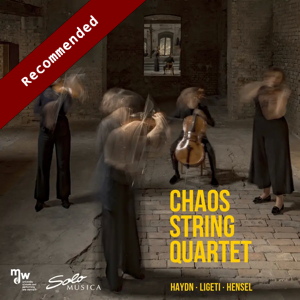
Joseph Haydn (1732-1809)
String Quartet in F minor, Op. 20 No. 5 (1772)
György Ligeti (1923-2006)
String Quartet No 1 Métamorphoses Nocturnes (1953-1954)
Fanny Hensel (1805-1847)
String Quartet in E flat major, H 277 (1834)
Chaos String Quartet
rec. 2023, Concert Hall at the Future Art Lab, mdw Campus, Vienna, Austria
Solo Musica SM457 [67]
The Chaos String Quartet’s interpretation of the first movement of Opus 20 No.5 is thoughtful and relatively subdued, an approach I like very much, as it admirably suits the pathos of Haydn’s sublime music. This is just another way of saying that these players are thoroughly musical. The intensity of emotion here, quiet passion (is that an oxymoron?), needs no underlining and the quartet’s restraint works beautifully – less is more. Much the same applies to the minuet, in which the players’ sensitivity amounts to great musicianship. In the Adagio, the leader Susanne Schäffer plays with remarkably spontaneous freedom and naturalness. Based on a theme familiar from several baroque works and Mozart’s Requiem, the contrapuntal finale is a brilliant tour de force but also deeply satisfying. This performance, unlike some, is not in the least driven.
Understandably, the thirty-year-old Ligeti was still influenced by Bartók, without sounding like a poor substitute. Indeed, his First Quartet – a masterpiece in my opinion – can stand alongside his compatriot’s six examples. Bartók’s influence immeasurably extended Ligeti’s unpredictability and wit – a priceless quality – while his boundless imagination never flags for a second. What can I say about this performance …? No superlatives can do justice. It simply has to be heard. Without reaching the Hensel quartet on this disc, already I urge readers to buy it. This is actually the debut recording of the Chaos Quartet and it is an exciting prospect to follow their career. In the Ligeti they encompass the astonishingly diverse moods, whether capriccioso or mesto, tranquillo or giovale, to select from the composer’s own tempos/expressive indications.
The Quartet by Fanny Hensel (better known as Fanny Mendelssohn) is touching without being compelling. Its slow movement develops towards a striking emotional intensity, but it obstinately falls short of memorability. Her brother’s quartets, still undervalued, are really fine works and to my mind on a higher level than this composition. I have come across comments which suggest otherwise – “the equal of any of her brother’s…” – but I strongly disagree. Fanny’s quartet is original, beginning with a slow movement, and is modestly attractive throughout, with a particularly energetic finale. Here an elegant melody soon emerges, but a similar kind of tune in one of Felix’s quartets – I can’t remember which – is simply one of those which stick in the head. Fanny’s work is very well crafted and amounts to an enjoyable twenty minutes, but it is not essential listening, in spite of the Chaos Quartet’s splendid advocacy. BBC Radio 3 is now regularly broadcasting music by women or composers of non-Western background who are perceived as unjustly neglected. I am always ready to express admiration for outstanding new pieces by such as Chaminade, Tailleferre, Lily Boulanger especially, Gubaidulina, Kats-Chernin and Tabakova, but I suggest that we must guard against over-promotion based on an agendum rather than true quality.
The recording quality is excellent. The booklet notes, in English and German and including an explanation of the Quartet’s title, are equally so.
Philip Borg-Wheeler
Buying this recording via a link below generates revenue for MWI, which helps the site remain free.




















